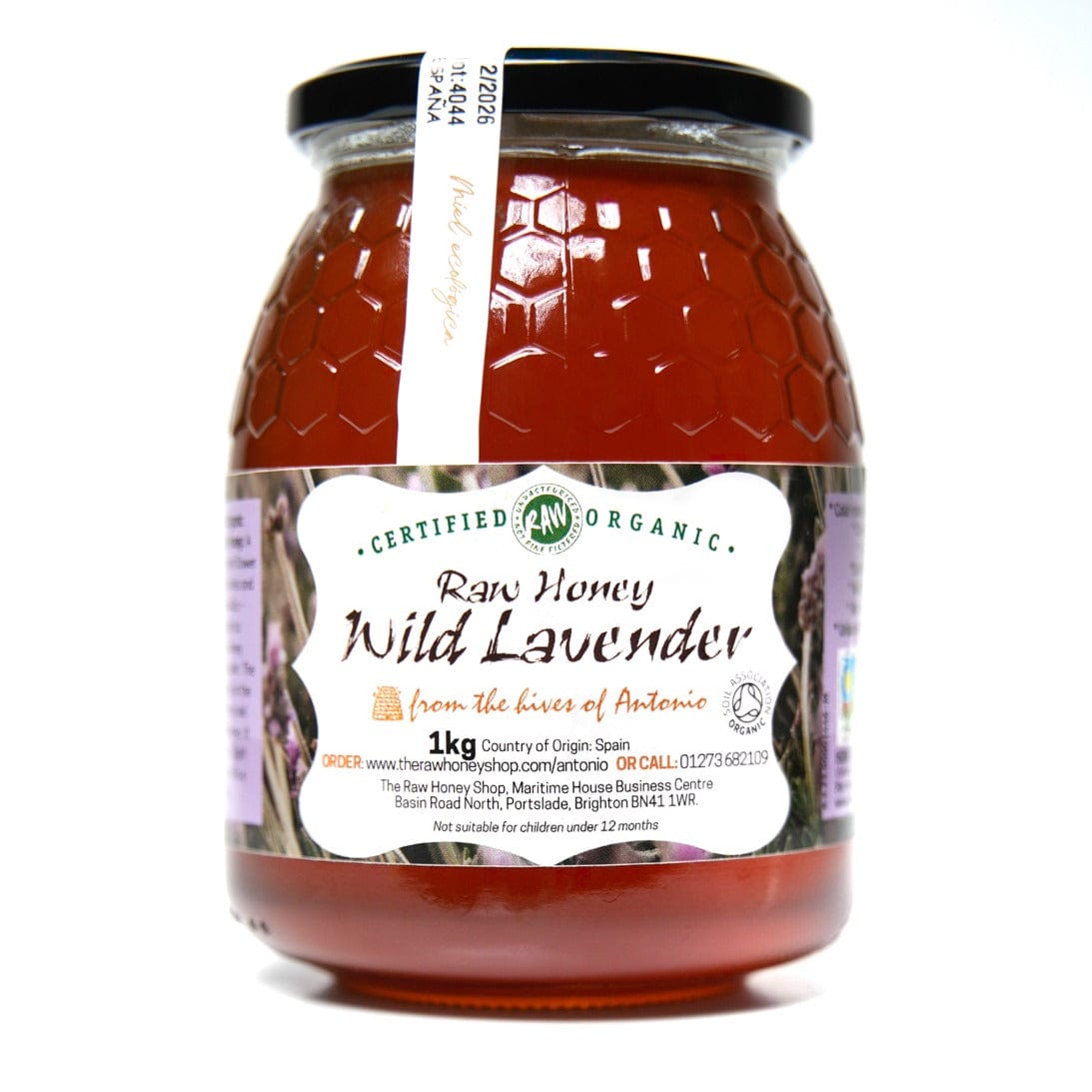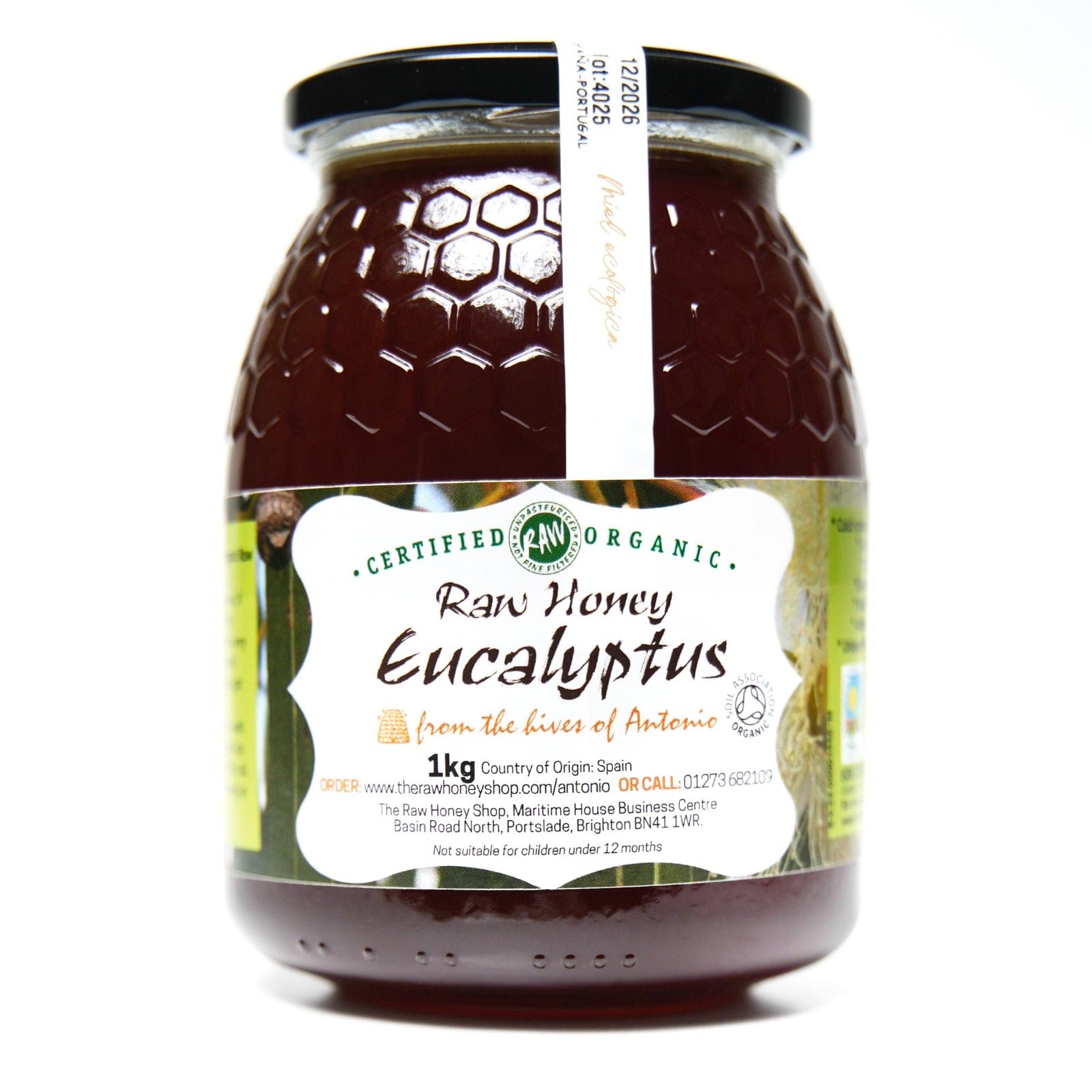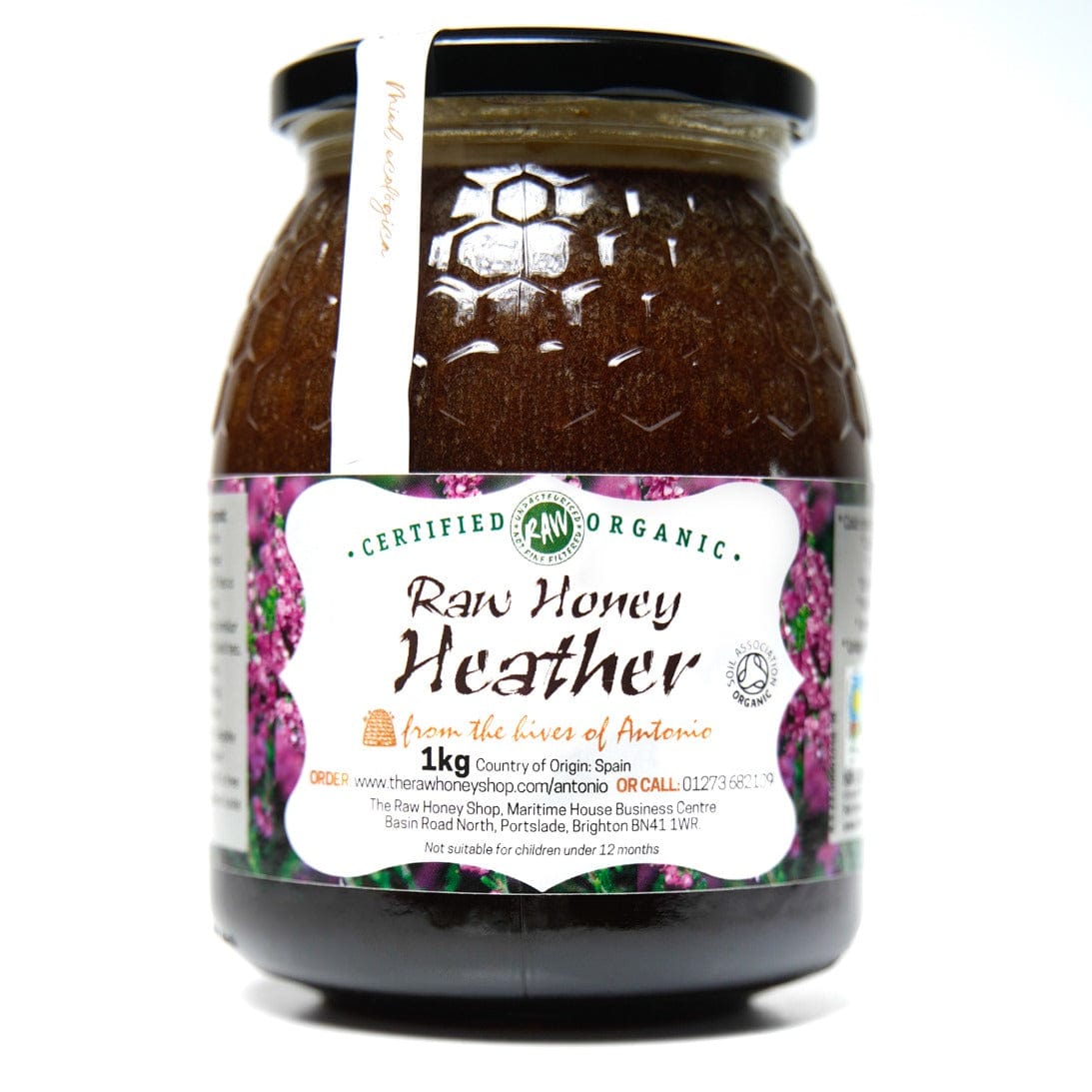

Antonio Simon, 4th generation beekeeper. Certified organic.
Follow Antonio as he goes to his mountain hives, where the Oak comes from.

The beekeepers at Antonio's hives
FOR YOU. PURE RAW HONEY - LIKE NATURE INTENDED.
Raw, natural, unpasteurised and incredibly tasty.
Antibacterial, coarse-filtered, unheated, enzyme-rich and all natural.
From wild mountains and remote forests free from pesticides, herbicides and fungicides.
Produced by the bees of small scale artisan beekeepers.
If you are seeking pure real raw honey then this is a place where you will find it.
Orange Blossom. And many more unique and unusual honeys.
Monofloral honey from trees like Oak and Chestnut. Beautiful blossom honeys from Wild Lavender, Thyme.
This isn't honey that we buy from a middle man, we go and seek out the beekeepers, learn all about them and the places where the bees make the honey. Beekeepers, like Antonio, whose bees collect a range of mountain honeys in the Sierra del Rincon Biosphere Reserve.
Only if the honey and beekeepers meet our standards do we buy a small amount to see if our customers like it. If it passes the customer test then we purchase larger amounts and promote it on a wider scale.
Follow Antonio to the mountains and the amazing wild place where his bees create pure organic honey.
If you have any questions, then don't hesitate to call us on 01273 682109 or send a message to info@therawhoneyshop.com
Change to Tim, Claire, Prue, Lizzie and Kish – The Raw Honey Shop Team
Here's a bit about our raw honey journey for you if you are new to our store.......
In about 1999 we stumbled across the most amazing wilderness honey high in the Pyrenees, just inside the Spanish border. That was a life changing discovery - honey that was raw and unprocessed, unlike anything we had ever tasted before.
Bringing it back for friends and family ended up with us selling the honey. If you are looking for pure raw honey that meets the following criteria then you have come to the right place:
- Honey that is from wild places, away from the pesticides and toxins you get from conventional agriculture, industry, motorways and other sources of pollution.
- Honey from traditional, small-scale beekeepers who don't use practices common to 'factory farmed' honey production - like not leaving the bees with any honey and giving them antibiotics.
- Honey that is minimally processed - just coarse filtered to remove debris and not pasteurised, which would harm the beneficial properties and flavour.
- Honey that is higher in the naturally beneficial qualities because it is raw and untreated.
- Honey to buy in bulk with volume discounts.
- Honey that is certified organic or produced according to organic principles. You can see our organic certificate here..
- Exciting monofloral honeys like Oak, Chestnut, Rosemary, Thyme, Lemon Blossom and more.
It's important to note that because this is raw honey it does crystallise after a while, unlike the pasteurised highly filtered honey found in supermarkets, which stays runny for a very long time.
This is natural and should be expected with really raw honey.
Follow Antonio as he goes to the mountain hives
If you have any questions, then don't hesitate to call us on 01273 682109 or send a message to info@therawhoneyshop.com
Tim, Claire, Prue, Lizzie & Kish - The Raw Honey Shop Team
Here's a bit about our raw honey journey for you if you are new to our store.......
In about 1999 we stumbled across the most amazing wilderness honey high
in the Pyrenees, just inside the Spanish border. That was a life changing discovery - honey that was raw and unprocessed, unlike anything we had ever tasted before.
Bringing it back for friends and family ended up with us selling the honey. If you are looking for pure raw honey that meets the following criteria then you have come to the right place:
- Honey that is from wild places, away from the pesticides and toxins you get from conventional agriculture, industry, motorways and other sources of pollution.
- Honey from traditional, small-scale beekeepers who don't use practices common to 'factory farmed' honey production - like not leaving the bees with any honey and giving them antibiotics.
- Honey that is minimally processed - just coarse filtered to remove debris and not pasteurised, which would harm the beneficial properties and flavour.
- Honey that is higher in the naturally beneficial qualities because it is raw and untreated.
- Honey to buy in bulk with volume discounts.
- Honey that is certified organic or produced according to organic principles. You can see our organic certificate here..
- Exciting monofloral honeys like Oak, Chestnut, Rosemary, Thyme, Lemon Blossom and more.
It's important to note that because this is raw honey it does crystallise after a while, unlike the pasteurised highly filtered honey found in supermarkets, which stays runny for a very long time.
This is natural and should be expected with really raw honey.

Certified organic beekeeper.
Best Sellers
When we say our honey is raw, we mean a few things.
The most basic point is that Raw honey is honey as it was in the hive. Itis simply extracted without heat and lightly strained to remove debris, preserving its natural enzymes, pollen, propolis and antioxidants. In contrast, processed honey undergoes intensive filtering and heating that destroys many of these beneficial compounds.
Raw honey crystallises naturally over time and appears cloudy with visible particles of pollen or honeycomb, whereas processed honey is filtered and heated to create a clear, always-liquid product that looks more appealing on store shelves.
Raw honey's flavour is exactly as created by the bees and is determined solely by what flowers and trees the bees visited, creating distinctive monofloral varieties each with their own unique taste profile.Commercial honey, however, is typically blended from multiple sources to create a standardised taste that remains consistent year-round.
Rawhoney undergoes very minimal processing –
just simple straining to remove obvious debris like wax and dead bees. In
contrast, processed honey goes through ultra-filtration that sometimes removes
even microscopic particles including beneficial pollen.
Raw honey has all the natural enzymes and beneficial compounds intact. Processed honey, through heating and filtering, loses many of these natural
properties - the more intensive the processing, the greater the loss of
beneficial compounds. We can tell from lab tests we run that the honey we
buy is fresh and unprocessed.
Each batch of raw honey is different – it
varies in colour, consistency and flavour based
on seasonal changes and nectar sources, while processed honey is
deliberately standardised to look and taste the same regardless of its
source or season of production.
Raw honey is normally produced by small-scale or organic beekeepers who
prioritise ethical, sustainable practices, ensuring the health of the bees and their environment. Processed honey from large commercial suppliers is mass-produced, sometimes at the expense of ethical beekeeping practices,including overharvesting and artificial feeding of bees with sugar syrups.
There is fake and adulterated honey out there, so this is a fair question.
Here’s how we go about ensuring the honey we sell is the real thing:
If you ever have questions about a particular honey, just ask—we’re happy to
help. 01273 682109 or info@therawhoneyshop.com
If you place your order before 1 pm on a working day (Monday to Friday,excluding bank holidays), we'll pack and hand it
to the shipping company the same day. Orders placed after 1 pm or during non-working days will be processed on the next working day. For example, if you order after 1 pm on a Friday, your package will be dispatched on Monday.
For UK deliveries, we primarily use Royal Mail's Tracked services:
Tracked
24: Aims to deliver the next working day after dispatch.
Tracked
48: Aims to deliver within two to three working days after dispatch.
Please note that 95% of Royal Mail Tracked 24 deliveries arrive within one working day, and 95% of Tracked 48 deliveries within two working days; however, a small percentage may take slightly longer. In extreme weather conditions, please allow additional time for deliveries.
For international orders, shipping times vary depending on the destination country and the carrier used. Due to additional paperwork needed for international shipping, orders with non UK addresses willtake slightly longer to process. Orders placed on a working day before 1 pm will normally be packed and handed to the shipping company within two working days. Orders placed after 1 pm will normally be packed and handed to theshipping company within three working days.
If you have any questions or need assistance,feel free to contact us at info@therawhoneyshop.com or call +44 (0)1273 682109
When it comes to soothing a cough or easing a sore throat, the best honeys are thick, dark honeys. These coat the throat more effectively, providing relief and helping to reduce irritation.
They also tend to have higher levels of antioxidants and antimicrobial compounds, which can help ease symptoms.
Why Thick, Dark Honeys Work Best:
Coats the Throat – Thick honeys form a protective layer over the throat, reducing irritation and suppressing the cough reflex.
Higher in Antioxidants – Dark honeys contain higher levels of flavonoids and phenolic acids, which may help reduce inflammation in the airways.
Antimicrobial Properties – Most dark honeys have naturally high antibacterial activity, which may help fight infections in the throat.
Moisturising Effect – Honey helps retain moisture in the throat, preventing dryness that can trigger coughing.
Examples of Effective Honeys:
Oak Honey, Forest Honey, and Fir Honey – These are thick, dark honeys that coat the throat well and have strong antioxidant properties.
Sidr Honey – Known for its potent antibacterial activity, making it ideal for bacterial sore throats.
Organic honey:
· Organic certification involves rigorous oversight, including unannounced inspections of apiaries and laboratory analysis of honey samples to verify compliance
· The bees must forage in areas where all plants within a specified radius of the hives are either wild or certified organic, with no exposure to pesticides, industrial areas, or conventional farming
· The hives must be made of natural materials like untreated wood and beeswax foundation, avoiding plastic or artificial materials
· Focus on preventative healthcare. Since antibiotics are prohibited for all beekeeping in Europe, organic beekeepers must focus heavily on preventive measures and natural methods for maintaining bee health
· The bees must be left enough honey to get them through the winter. If supplemental feeding is needed (like during a very long winter), bees must be fed organic honey or organic sugar. Any honey created during the feeding period cannot be sold
· No synthetic chemicals can be used in hive maintenance or honey extraction
· IMPORTANT: Bear in mind that organic doesn't necessarily equal 'raw'. Organic honey can be heat treated, blended and fine filtered
Non-organic honey:
· Bees are much more likely to be fed sugar.
· The hives can be placed literally
anywhere. For instance, the hives may have been placed close to crops that
have been treated with pesticides and other chemicals, which may contaminate
the honey.
· May contain traces of synthetic chemicals.Non-organic hive treatments may introduce chemical residues into the honey.
· No restrictions on genetic modifications.The bees may forage on genetically modified (GM) crops, whereas organic certification prohibits GMOs.
· While antibiotics are prohibited (as in all European beekeeping), may use treatments for pest control and hive maintenance that aren’t allowed in organic beekeeping.
· No restrictions on using chemical treatments for cleaning equipment or storage containers.
· Quality control and lab testing may be less frequent and comprehensive.
· Processing facilities don't require special certification or separation from other food processing.
· Can use modern hive materials including plastic frames and foundations.
Having said all that the cost of registering for organic certification may be beyond the means of many beekeepers. We do sell a small amount of non organic honey but only from beekeepers who follow organic principles, despite not being certified.
Yes, you can add raw honey to hot drinks, but
there are some important considerations:








